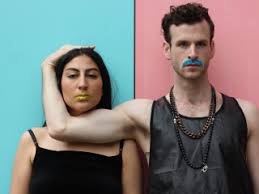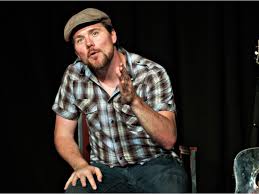AIN’T TRUE AND UNCLE FALSE
God, we’re fragile. God, we’re beautiful.
In Ain’t True and Uncle False—which is, I guarantee, one of the finest and most original shows you’ll ever see—solo artist Paul Strickland introduces us to his friends and relatives from the Big Fib Trailer Park. The main employer in Big Fib is the pea-punching plant, where locals make regular peas black-eyed.
The homespun inventiveness just keeps coming. In stories that are announced as if they are revelations from the Almighty, we hear about Will, the boy who lost his hand—simply misplaced it—when he was 7, and the conjoined twins who were born a year apart. Underlying all of this, there’s a touching meditation on temporality and decay, on dementia and death. In celebrating the trailer park, Strickland is also trying to preserve it.
“When the peculiar becomes familiar and safe, that’s when you know love”, Strickland says at one point. Just before hearing that line, I had written in my notebook, “I feel safe.”
Remaining performances at Performance Works on September 11 (6:50 p.m.), 14 (5 p.m.), and 16 (4:35 p.m.)

This isn’t what A Night at the Rose Coloured Discotheque looks like, but it is a visual introduction to talented young artists Arggy Jenati and Dylan Archambault.
A NIGHT AT THE ROSE COLOURED DISCOTHEQUE
Hey kids! Let’s make this show a hit! Because that’s what it deserves to be.
In A Night at the Rose Coloured Discotheque, writers and performers Dylan Archambault and Arggy Jenati satirize the hollowness of gay club culture and explore the ennui of unfulfilled artistic dreams—while creating a very, very good time for the audience.
Instead of preaching, they dance their pants off as club kids Jorge and Toasty, who are, essentially, clowns. Jorge is desperate to find a husband so that he can pattern his life on the apparently blissful existence that Neil Patrick Harris shares with his spouse and their twin boys. But, as Jorge points out, it’s easier for him to find penetrative sex than somebody to go for coffee with. And, romantically, Jorge tries way too hard. When he hits up guys in the audience, it’s not long before his speech devolves into desperately disappointed stuttering laughter.
Toasty, the frustrated actor, drunk dials her mom and calls her a bitch for never supporting her. But she recognizes the joy in Jorge: “He is the ribbon to your wrapping…the bleach to your butthole.”
Archambault and Jenati expertly switch up forms and textures, flipping from pure dance to dialogue, monologues, and playful audience engagement.
And, beneath the glitter, there’s an enormous, substantial heart. As I was leaving the theatre, I ran into a young gay man who said, “There’s no more water in my body. It all just came out through my eyes.”
Remaining performances at The Cultch Historic Theatre on September 12 (5 p.m.), 16 (5:35 p.m.), and 17 (2:30 p.m.)
THE MESSENGER
This show is oddly liberating—and that’s a good thing because, at first, I was afraid that I was about to spend 75 minutes with a seriously mentally ill person.
Damonde Tschritter, who makes his living as a stand-up comic and comedy writer, starts his non-fiction monologue by talking about how he has learned to follow signs—like the wood grain in floorboards, and flashing numerals on clocks. Okay. Sure.
Then things take a turn when he says, “I got a phone call from a woman who knows how to talk to dolphins.” That launches him into the body of the piece, which is about his experiences during ayahuasca ceremonies in Mexico. His story could still feel a little self-aggrandizing—Tschritter is, apparently, one of God’s chosen—but he knows that what he’s saying sounds nuts, and he employs an endearingly ironic delivery. He is disappointed when his shaman looks like Lily Tomlin, for instance: “I was expecting a Peruvian woman with a bowl cut and a necklace made of human knuckles.”
His visions are arresting, to put it mildly, and a reminder of the advantages of, at the very least, paying attention to metaphors in the everyday world.
Remaining performances at The Cultch Historic Theatre on September 12 (9:35 p.m.), 15 (10:15 p.m.), and 17 (6:30 p.m.)







0 Comments